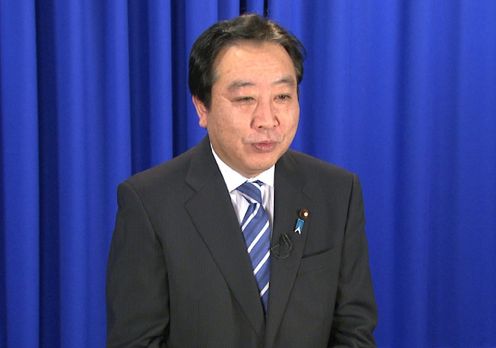Home > News > The Prime Minister in Action > January 2012 > Davos Video Conference
Davos Video Conference
Saturday, January 28, 2012

Photograph of the Prime Minister participating in and addressing the Davos Meeting by video conference
Prime Minister Yoshihiko Noda participated by video conference via satellite in the World Economic Forum (WEF) 2012 Annual Meeting (Davos Meeting) session, "Tough Choices in a Time of Crisis," which was held in Davos, Swiss Confederation.
In the video conference, the Prime Minister said, "I am honored to be able to participate from Tokyo, approximately 10,000km away from Davos. I understand that a discussion will follow on the theme of 'Tough Choices in a Time of Crisis.' In hopes of contributing to this discussion, I would like to speak briefly about the status of Japan's ongoing recovery as well as Japan's challenges and the model it is presenting to the world.
I start with the status of Japan's recovery. The infrastructure and the economy of the disaster area are making a steadfast recovery. Many Japanese companies achieved restoration at an astounding speed, with the supply chain having fully recovered. At the end of last year, the nuclear reactors of Tokyo Electric Power Company's (TEPCO) Fukushima Daiichi Nuclear Power Station reached a state of cold shutdown. There are no major impediments to conducting business in Japan. A system of special zones for reconstruction has been realized, and a five-year corporate tax exemption measure is being taken. Japan highly welcomes foreign investment to jointly advance the recovery. Japan is resolved to even further speed-up the open recovery process.
In this process, Japan, in the wake of the Great East Japan Earthquake, is currently playing a historic role in taking on humankind's front-line challenges.
The first challenge is aiming for sustainable growth while maintaining fiscal discipline. Japan will face up to the difficulties of addressing a society of longevity unprecedented in human history. A major challenge is the rebuilding of a sustainable social security system. Including in my recent speech to the Diet, I have stressed the need to break away from politics that can't decide. Japan would like to practice politics that do not put off work and become a frontrunner of countries which find themselves in a similar political situation. In order to forge a sustainable social security system and maintain fiscal discipline to this end, I am resolved to realize reforms, including the consumption tax increase.
The second challenge is the promotion of innovation and the response to energy constraints. By expanding renewable energies, advancing efficient energy management systems, such as rechargeable batteries and smart grids, and promoting a culture of thorough energy conservation, among other measures, Japan is committed to continuing to lead the world in this area and significantly contribute to the global transition to a green economy.
The third challenge is the sharing of lessons learned from the earthquake disaster and international contribution in the area of disaster management. The Great East Japan Earthquake last year was a multiple disaster, which included a great earthquake disaster, tsunami, and nuclear power disaster. And the disruption of the supply chain as well as the issue of the safety of nuclear power generation had an impact both within and outside of Japan. It is indeed not an overstatement to say that risks have become globalized. The lesson that Japan learned is that in the face of crisis, swift disclosure of information and transparency and accountability are essential. It is imperative that known information is disclosed to the people in and outside of Japan carefully, in a way that is easy to understand.
This year, a high-level international meeting on large-scale natural disasters is scheduled to be held in Japan. Japan's stance is to share its lessons learned from the earthquake disaster broadly to the international community. We should also remember that it is the socially vulnerable who are severely affected by multiple crises. The perspective of human security is critical in my opinion. Japan will continue to actively address the issues also facing the international community, such as poverty and infectious diseases, and contribute to the international community. While Japan must work hard to fulfill recovery, I believe that it has the will and capacity to also proactively contribute to global challenges without becoming inward-looking. Through 'politics that do not put off work,' I would like to lead the way in making contributions to the world."
